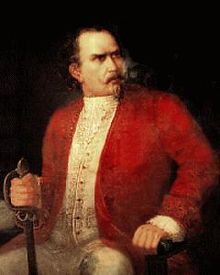Francisco Laso de la Vega
Francisco Laso de la Vega (* 1586 in Secadura in Santander , Spain ; † 25. July 1640 in Lima , Peru ) was a Spanish military and governor in Chile .
Life
Origin and career in Europe
De la Vega was the son of Garcí Laso de la Vega and María de Alvarado. In 1606 he joined the Spanish Navy, the Armada , and worked there for five years.
He then switched to infantry and served in Flanders , where he stayed for sixteen years. He excelled in a number of battles, such as the siege of Bergen, and was promoted to captain . In 1623 he was accepted into the Order of Santiago . Two years later he returned to Spain, where he took the post of governor of Jerez de la Frontera in southern Spain.
Term of office as Governor of Chile
The news of the death of the Chilean governor Pedro Osores de Ulloa reached Madrid at the end of 1625. King Philip IV had to appoint a successor and finally decided - after Pedro Dávila had been chosen - for Francisco Lazo de la Vega as the battle-ridden military. he thought he could make a decisive turn in the war against the Indians. The certificate of appointment with the eight-year appointment is dated March 16, 1628.
The Spanish colonial troops in Chile were in urgent need of new forces from Europe in the Arauco war against the Mapuche Indians. But the tense financial and military situation in Europe did not allow the Crown to send more soldiers or funds to Chile.
Lazo de la Vega traveled to Chile via Panama . He reached Concepción in the midst of a storm in December 1629. On July 23, 1630, he reached Santiago . He then held the post of governor of Chile until 1639.
His tenure was marked by the ongoing war against the Mapuche. The Spanish troops were weakened, ill-equipped and demoralized; they had been on the defensive for 14 years. Numerous fortifications that the Spaniards had built in the south had to be abandoned. Lazo de la Vega managed with tactical skill to turn the course of the war back in favor of the Spaniards. In the battle of La Albarrada in January 1631 he achieved a major victory against the Indians, which, however, ultimately could not decide the war.
After being ill for a long time, he was waiting for his successor Francisco López de Zúñiga y Meneses to end his term of office . After his arrival, he set off for Peru and died of dropsy in Lima shortly after his arrival - on Santiago's name day of all places .
literature
- José Toribio Medina : Diccionario Biográfico Colonial de Chile . Imprenta Elziviriana, Santiago, Chile 1906, p. 450–451 (Spanish, memoriachilena.cl [PDF; accessed June 15, 2010]).
- Diego Barros Arana : Historia General de Chile . tape 4 . Editorial Universitaria, Santiago de Chile 2001, p. 213-256 (Spanish, memoriachilena.cl [accessed June 10, 2010] First edition: 1886).
| personal data | |
|---|---|
| SURNAME | Vega, Francisco Laso de la |
| BRIEF DESCRIPTION | Spanish military and governor |
| DATE OF BIRTH | 1586 |
| PLACE OF BIRTH | Secadura , Spain |
| DATE OF DEATH | July 25, 1640 |
| Place of death | Lima |

